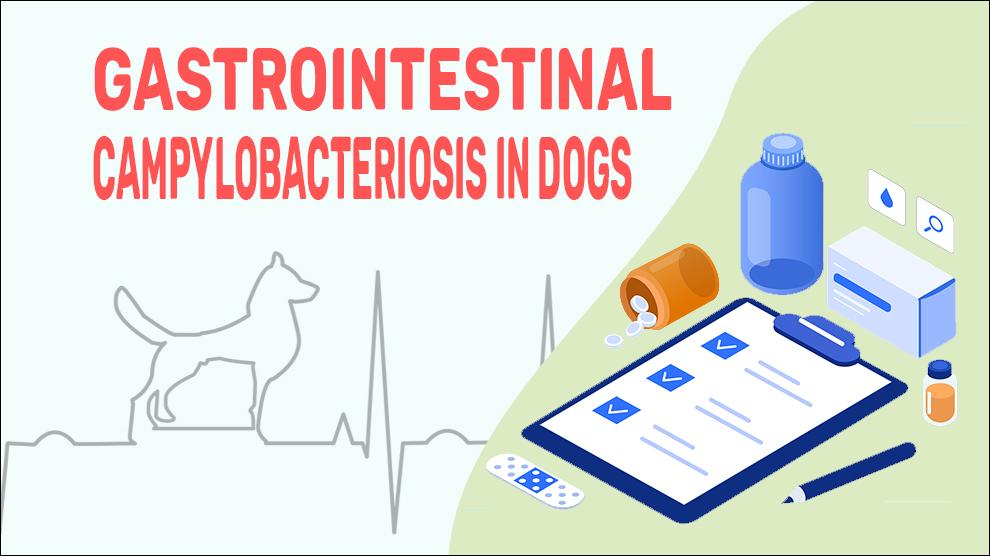What Is Gastrointestinal Campylobacteriosis In Dogs?
Gastrointestinal Campylobacteriosis is a multifactorial disease characterized by chronic inflammation of a dog's intestinal tract distinguished by the presence of inflammatory cells (chronic enteropathies) which cannot be associated with other possible health conditions.
The continuing inflammation damages the intestinal tract and this inflammation interferes which impairs the ability to digest and absorb nutrients which in turn leads to other health problems.
Campylobacter upsaliensis and Campylobacter jejuni are the common cause of enteritis in humans. These bacteria are also found in the stool of both normal and sick dogs suggesting that they are not the primary reason for gastroenteritis type of illness in dogs.
The important causes of infection in humans are consumption of contaminated raw milk, water, undercooked poultry or chicken, and food particles that have been infected at the time of preparation. Both these bacteria are considered to be part of the normal intestinal flora of many animals and birds.
Dogs seem to get infected with Campylobacter by fecal-oral spread i.e., infected feces or infected food, like contaminated water or raw meat.
Symptoms Of Gastrointestinal Campylobacteriosis In Dogs
Treatment Options ForGastrointestinal Campylobacteriosis In Dogs
The Treatment depends upon the underlying cause and extent/severity of the problem.
Medications for medical conditions should be provided only as required.
Antibiotics: Azithromycin or erythromycin.
Anti-inflammatory and Immunosuppressive Therapy: Prednisolone or prednisone, Cyclosporine, Chlorambucil, Budesonide, or Sulfasalazine.
Dietary Management:
- Switch over to a diet that leads to antigenic modification (eg, protein hydrolysate, novel protein source).
- Exclusion diet: Removal of ingredients that a dog has previously encountered.
- A homemade balanced diet is an alternative to commercial diets.
Home Remedies For Gastrointestinal Campylobacteriosis In Dogs
- Access the severity of the condition, look into your dog's bowel movements, and check whether the things escalate or clear up.
- Contact your vet right away if your pet has frequent bouts of diarrhea in a short time period.
- When dietary change gets a good response, that particular diet can be maintained for some time as long as it is balanced.
- Reintroduce a bland diet that requires minimal digestion for a day or two. Feed cooked white rice and little white meat such as chicken or fish.
- Offer each meal in small quantities every 3 - 4 hours - consider 2 tablespoons for small dogs and 3 or 4 tablespoons for larger dogs.
- When your dog is feeling good, slowly reintroduce its regular food.
Prevention Of Gastrointestinal Campylobacteriosis In Dogs
- Takes steps to avoid contamination of bird droppings or feeding area with canine feces.
- When going for walks, keep your dog away from dust, sandy areas, and other areas in the woods.
- Maintain your lawn or garden. Clean the water sources. Keep it neat and clean to avoid unwanted complications.
- Herding dogs access to the feeding areas should be restricted, and pastures should be reduced.
- Feed high-quality food andexercise regularly.
Affected Dog Breeds Of Gastrointestinal Campylobacteriosis
Pregnant Dog, Basenji, Boxer,French Bulldog, Border Collie, German Shepherd, Irish Setter, Norwegian Lundehund, Rottweiler, Soft Coated Wheaten Terrier, Yorkshire Terrier, Weimaraner
Additional Facts For Gastrointestinal Campylobacteriosis In Dogs
- Causes:
- Dogs with diarrhea.
- Puppies (<six months) in congested housing or unsanitary conditions.
- Dogs with concurrent intestinal infections (Salmonella, Parvovirus, Giardia, or any other parasitic infection).
- Types:
Acute Campylobacteriosis: Sudden onset and most destructive.
Chronic or recurring Campylobacteriosis: This lasts for several weeks or even longer.
- Mortality:
Death from Campylobacteriosis is rare. With proper treatment, most dogs with Campylobacteriosis can enjoy a good quality of life.
- Diagnosis:
- A complete blood count (CBC).
- Electrolyte tests
- X-rays and Ultrasound
- Colonoscopy tests
- Pancreas tests to rule out pancreatitis.
- Viral infection tests to rule out viral infections.
- Fecal smears / Cultures / PCR testing.
- Prognosis:
The degree of the infection depends on the age, any coexisting infections, and the immune response of the host. The prognosis for Campylobacter is really good. Most dogs undergoing treatment will recover within a few weeks. If left untreated, severe cases of Campylobacter can be fatal for dogs, especially for puppies, so head to your vet immediately.
The disease presentation varies widely from acute, and peracute to subclinical or even chronic.
When To See A Vet For Gastrointestinal Campylobacteriosis In Dogs?
Contact your vet right away, if you notice any of the following:
- Chronic diarrhea
- Chronic vomiting
- Weight Loss
Food Suggestions For Gastrointestinal Campylobacteriosis In Dogs
- Lean Protein and Low-fat meats (ratio of omega-6 to omega-3 fats = 5:1).
- White Rice, Boiled boneless, skinless chicken breast meat.
- Probiotics (yogurt, Goat's Milk, fermented vegetables, kefir with live cultures).
- Potatoes and Pumpkin (canned or pureed).
- Mashed boiled potatoes, and carrots.
- v, Apples, Seaweed.
Conclusion
While Campylobacteriosis is caused by zoonotic bacteria and it can be passed between humans and animals, it is less likely if you practice good personal hygiene.
For cases with localized infections, the prognosis is generally good. About 25% of affected dogs relapse once treatment is finished.
The prognosis for systemic Campylobacteriosis varies inversely with delay in detection, severity, and evidence of the failure of vital organs.

















